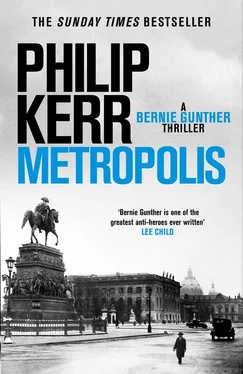‘How do you mean?’ I asked.
‘All of this fake sexual freedom and eroticism, it puts me in mind of the last days of ancient Rome. And I keep thinking that ordinary Germans just wish it would all go away so that they could get back to living calm, orderly lives.’
‘You’re probably right. But I worry what we’ll replace it with. Something worse perhaps. And that maybe we’ll regret its passing. I don’t know. Better the devil you know.’
When she’d gone I realized, too late, that Rosa had looked a bit lonely and that I should have talked to her more and even made it a little clearer that I liked her, but at that particular moment I had something else on my mind. Ernst Gennat would probably have said that a living girl — even one dressed like a man — is always more interesting than a dead one, especially a girl as pretty as Rosa, but I was keen to prove that Bernhard Weiss had been right about me, that I wasn’t another cynical Berlin bull, that I believed in the job and that I was the right man for Lindner’s seat. So I sat down in the armchair and lit another rum-moistened roll-up. There was just time to read the facts of the second Winnetou case before the Alex murder wagon showed up.
The mutilated body of Helen Strauch was found in the old cemetery of St Jacobi’s Church, just south of Hermannplatz, in Neukölln. The wide shots of the cemetery showed a not-unattractive mourning chapel resembling a small Greek temple, a Doric colonnade, several lime and chestnut trees, and a shapeless figure at the feet of a statue of St Jacobi as if prostrate in prayer. Close-ups of the head and the body showed Helen Strauch was lying face-down on some blackened flagstones that had been previously chalk-marked for the children’s hopping game called heaven and earth. According to the police pathologist, death had been more or less instantaneous; she’d been struck a mortal blow on the back of the neck — which is the weakest and most vulnerable part of the human body — leaving behind a bruise the size and colour of a red cabbage, and then scalped from the centre of her forehead to the occipital bone at the back of her skull. Like Mathilde Luz, there was no evidence that the killer had sex with his victim; there was even a ten-mark note still in her garter. The time of death was not long after midnight on the twentieth of May.
Helen had lived on Hermannstrasse, which ran along the eastern perimeter of the cemetery. According to the police report you could see the murder scene from her bedroom window; at least you could when the window was clean. The area, generally known as the Bullenviertel, was one I’d policed as a uniformed bull, the kind of area where a cop learned his trade fast — a grey and desolate place where people worked long hours for not much money, the air stank of roasted malt, barefoot children ran wild at all times of the day and night, every second cellar shop was a bar selling cheap and often illegal booze, and the Salvation Army was in almost permanent residence. I’d often had to shoo prostitutes out of the cemetery at St Jacobi’s; they were inclined to use the colonnade to service their clients. But safe in my rooms in Nollendorfplatz and wearing a clean shirt collar and tie, I already felt like a stranger to the slums.
Helen Strauch was a prostitute who’d previously worked at the Bergschloss Brewery, which was only a short distance from where she was found dead. When she’d been laid off last summer, it seemed she’d had little choice but to become a full-time prostitute. This already looked like a typical Berlin story. On the night of her death she’d spent the evening drinking absinthe cocktails in the brewery bar on Hasenheide before going on the street. No one remembered her with a client or seeing her talking to any particular man. One girl did think she remembered Helen talking to someone in a car, with her foot up on the running board, but she didn’t remember the type of car or the number plate, nor indeed the man, if it was a man. Opposite the brewery on Hasenheide was a hospital where Helen had gone for an appointment the previous day — a pregnancy test, which proved negative.
The body had been found by Walther Wenders, a drayman from Babel’s Brewery in Kreuzberg; beer in that part of Berlin is more than just a drink, it’s a way of life. Wenders lived on Berlinerstrasse and his walk to work took him west, past the little cemetery where he’d stopped for a quick pee, which was when his eye caught something unusual. At first he thought it was just an old coat someone had thrown away. It looked like a good coat and his wife certainly had need of one, but as soon as he saw the blood on the ground he realized exactly what he was looking at. It was obvious that there was nothing to be done for the girl, so he walked quickly west to the hospital on Hasenheide and raised the alarm there. The regular detective attached to the Murder Commission on that occasion had been Kurt Reichenbach who, having carefully searched the area on his hands and knees, found a man’s gold cuff link engraved with a Freemason’s symbol — the set square and compass. For a while it had looked like an important clue since Helen’s poor cheek had been resting on the number nine, which has a special meaning in freemasonry; or so Reichenbach had argued.
Born in Thuringia in 1904, Helen Strauch had lived nearly all her life in Neukölln; her mother had left her drunken woodcutter father and come to Berlin to become a piecework seamstress in a garment factory before she had drowned herself in the Landwehr Canal aged just thirty-five, when Helen was only fifteen. The reason: early onset of arthritis that had stopped her from making her living. Helen then had an on-and-off relationship with a man called Paul Nowak who was employed at the gasworks on Fichtestrasse and who lived in a room on Friedelstrasse. But Paul Nowak was also a part-time prostitute and he had a fistful of alibis for the night of the murder, having spent the evening at several queer bars in Bülowstrasse — the Hollandais at number 69, the Continental at number 2, the Nationalhof at number 37, the Bülow Casino at number 41 and the Hohenzollern lounge at number 101 — before bringing a gentleman home to his room on Friedelstrasse. All the barmen remembered seeing him that night, and even his client, a Dutch businessman called Rudi Klaver, who happened to be a Freemason himself, had provided him with an alibi, which says a great deal about how open homosexual men were in Berlin. ‘Berlin means boys’ was a widely held thought throughout the Weimar Republic. But the fact was that ever since Frederick the Great had forbidden women to his Praetorian Guard in the 1750s, obliging the guards to seek the company of boys for their sexual pleasure, Berlin had been identified with soldierly inversion and uranic sexuality. Paragraph 175 of the Federal Criminal Code still forbade all homosexual activity but there were so many male prostitutes in Berlin — at the Alex it was generally held there were at least twenty-five thousand of them — that the law was generally held to be more or less unenforceable.
Nowak had a criminal record for car theft and from the police photograph, he was no one’s idea of a rent boy; he was a large, powerful bearded youth who hunted wild boar in the Grünewald on his weekends and often skinned the beasts himself. He had knives, sharp knives, but then so did most Berlin men. I kept a folding knife in my jacket pocket myself; made by Henckels of Solingen, it was as sharp as a razor and could have scalped a bowling ball. Nowak wasn’t a violent man, however; if anything, Helen Strauch had been the abusive partner in their relationship. She was a boot-whore, which is to say, she was a dominatrix who got paid to beat up her clients. Now and then she took a cane to Nowak, who, friends said, frequently took a whipping without complaint. Gennat liked Nowak for the murder and he liked his sharp knives, too, but with all those alibis in the back pocket of the boy’s greasy leather shorts — Nowak was only eighteen years old — he couldn’t make it stick. But most of all, on the night Mathilde Luz had been killed, Nowak had been in a cell at the police station on Bismarckstrasse following an allegation that he’d robbed another client with whom he’d had sex — an allegation that was subsequently withdrawn.
Читать дальше












